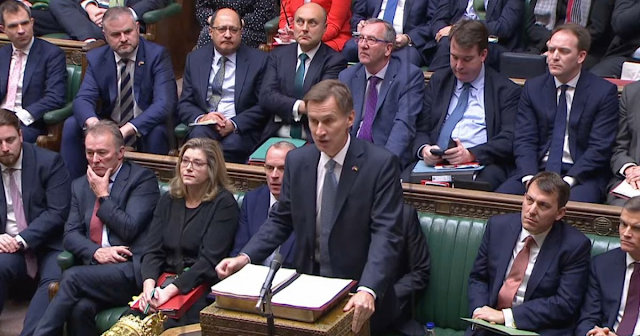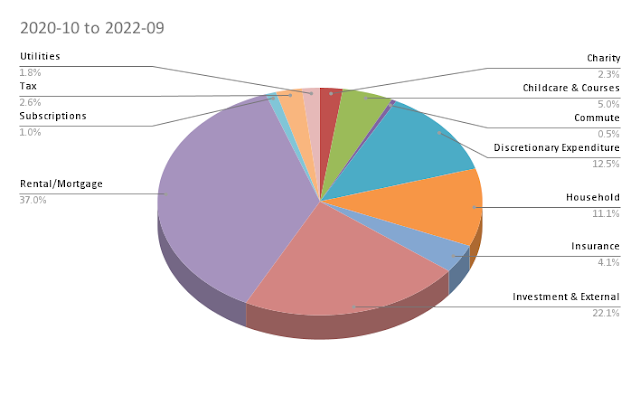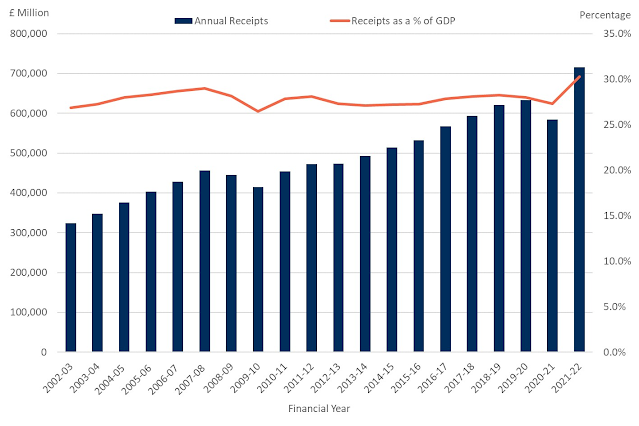UK's Silicon Valley aspirations and the witch hunt of middle-income professionals
We are now past the autumn budget, which ended up being another cornucopia of tax increases, stealth or otherwise, but a lot of that was along the expected lines anyway. But there was some interesting reading.
If you go through the transcript of Mr. Hunt's speech, you will find that he mentions the Silicon Valley aspirationally at least twice in his speech:
I want to combine our technology and science brilliance with our formidable financial services to turn Britain into the world’s next Silicon Valley.
Three priorities for growth, then. Energy security, investment in infrastructure and a plan to turn the United Kingdom into the world’s next Silicon Valley.
This means he wants to foster a culture of "growth" (also mentioned 28 times in his speech). This would entail creating an environment of higher investment and higher entrepreneurism. The government wants companies, new or existing, to feel optimistic enough about the prospects of this country that they are willing to put either their real capital, or their opportunity capital, bloody and sweat into this country to create something out of nothing.
Exactly how is increasing taxes, both individual and corporate, going to inculcate that culture that will attract growth? It won't, but this is where the other side of the British tax system comes in..
The reality is that the UK tax code creates a punitive environment for those who aspire to get past middle income. The tax code, and consecutive chancellors (and the opposition parties, seeing their manifesto), all believe that £100K is too rich for a professional. There are evidences abound of this kind of thinking - Personal Allowance Taper, elimination of Tax Free Childcare, and the Pensions Annual Allowance Taper - all examples of the tax code doling out just that extra lit bit of punishment because someone got that extra little bit of fortune.
In each of the above case, we apply cliff edges and tapers such that planning someone's annual income becomes a game of pigeonholing their incomes - a dangerous game prone more to be lost than to be won. Dangers in this case are literal - Doctors unwilling to work additional hours for fear of a retrospective tax charge!
Let me tell you a little secret - £100K for a professional in the tech economy, living in London or thereabouts, is not a rich salary. It is just about making ends meet. It might be okay for a younger professional living on their own, but if it is a single-earning couple, or worse still, a single-earning family with children, £100K doesn't do much.
But hold on, isn't the median income £31,400 and isn't £100,000 more than 3 times that much and hence should avail no empathy from the general public? Yes, the median income is indeed £31,400 and we should do our level best to move that upwards so more of the local population can enjoy a better standard of living, but it shouldn't come at the cost of us punishing anyone who earns a higher living.
Economies are not zero sum games. In any economy, people of some professions, either because of the high level of training required, or due to demand-supply imbalance, will be paid significantly higher salaries than the medians. That's OK. That's how you get doctors, or PhDs, or software engineers. You also get a bunch of profligate investment bankers, but that's OK too - they have a role in the society too. And remember we tax them all at the highest marginal rate anyway.
In the India of late 1980s, we were besotted with a similar mentality. We believed that if we let anyone get rich in a country with so many poor, we were introducing moral hazard. Then by accident, India liberalised, creating truck loads of newly minted rich. In doing so, however, we also kickstarted the growth of the economy that leads to 100s of millions of Indians to be lifted out of poverty and destitution. So, what's more important, raising people out of poverty, or preventing some people from getting rich?
Remember that the people who lay the seeds for exponential growth, i.e. Entrepreneurs, or the professionals who help us get there, have to train hard or deal with other obstacles to get to where they are, and one of the motivations that keeps them going is to enjoy a reasonable portion of their wealth themselves when they succeed in doing so, or fail trying. Being ignorant of this basic tenet of psychology will only doom any attempts we make of creating room for economic expansion.
Some will say "trickle down economies" don't work. That is a moot point in the UK. We already have a robust system of taxing people up to 45% of their income (and a little more if you add in NI) or their margin income while alive and up to 40% when deceased, and that is enough sharing of their wealth for the purposes of nation building - we don't need to go overboard with punitive treatment of wealth.
As someone with socialist leanings on many days, I have no problem paying high taxes on high income. I just believe that a simple, fair, predictable tax code that makes responsible tax payers of our best talent is a far better outcome than the witch hunt at arbitrary thresholds this country has resorted to. If overall taxes maxed out at 45% and inheritance tax progressively went up with thresholds between 20-40%, then rest of the code becomes a good meeting ground of the needs for both the next Silicon Valley as well as British Compassion.
If we can't get a balance right, let's remember that the smartest people have a choice - they don't have to come here, or stay here, and build the great companies of the next generation - they will go where the world doesn't target them for wanting to get rich.




Comments